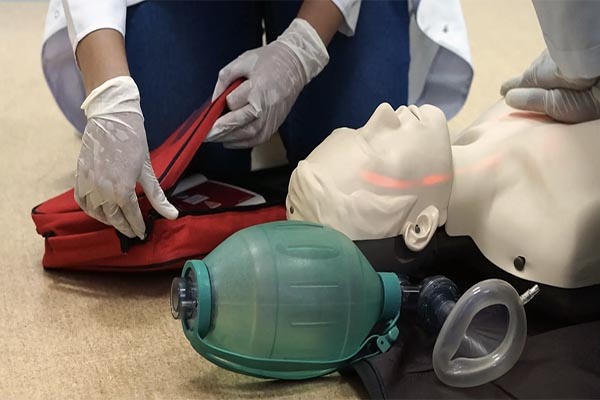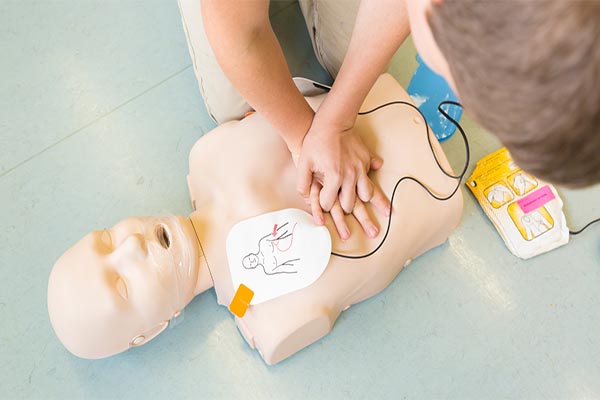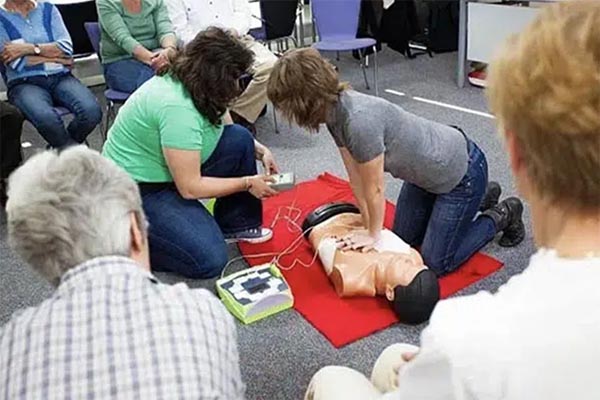
In the vibrant city of Denver, where businesses thrive amidst the Rockies, ensuring workplace safety is paramount. One critical aspect often overlooked is the preparedness for medical emergencies, particularly sudden cardiac arrests. Implementing CPR (Cardiopulmonary Resuscitation) and AED (Automated External Defibrillator) training in the workplace is not just a regulatory checkbox—it’s a commitment to the well-being of employees and clients alike.

The integration of CPR and AED training within Denver workplaces creates a safety net that benefits all stakeholders. Employees trained in CPR can provide immediate assistance during cardiac emergencies, significantly increasing survival chances. The presence of AEDs, coupled with trained personnel, ensures a rapid response, bridging the critical time gap before emergency services arrive. This proactive approach not only complies with safety regulations but also fosters a culture of care and preparedness.
Sudden cardiac arrest can strike without warning. Studies indicate that immediate CPR and AED use can double or triple survival rates. In a bustling city like Denver, where emergency response times can vary, having trained individuals on-site is invaluable.
OSHA recommends that employers provide CPR training as part of their first aid programs. Certain industries, such as construction and manufacturing, may have specific requirements. Ensuring compliance not only avoids penalties but also demonstrates a commitment to employee welfare.
Training employees in life-saving techniques empowers them, instilling confidence to act during emergencies. This empowerment can lead to increased morale and a sense of unity, knowing that the organization values their safety and development.
Proactive safety measures, like CPR and AED training, can mitigate legal risks and potentially lower insurance premiums. In the event of an incident, having trained staff can be a critical factor in legal considerations.
Denver businesses often interact with the public. Having staff trained in emergency response extends safety beyond employees to clients and visitors, reinforcing the organization’s role as a responsible community member.

Incorporating CPR and AED training into Denver workplaces is more than a safety measure—it’s an investment in human capital and community well-being. By equipping employees with the skills to respond to cardiac emergencies, businesses not only comply with regulations but also cultivate a culture of preparedness and care.
Contact CPR Classes Near Me today to schedule comprehensive CPR and First Aid training for your team. Empower your employees, protect your clients, and demonstrate your commitment to safety.
Our primary goal is to ensure that you receive a top-quality CPR/First Aid certification. With our in-person training in Austin, you can learn CPR and BLS in just one class. Your presence is all that’s needed to continue with your lesson! During your session, you will complete all the live-training components necessary to ensure you receive your AHA Healthcare Provider certification card.
Our CPR Classes in Austin are discounted to $59.95 (saving you $20), and our CPR + First Aid Class is offered at $79.95 (also saving you $20). When looking for CPR Classes, ensure to check for the American Heart Association seal. Other sites might seem cheaper but frequently lack the official training credentials demanded by employers.
Upon successful completion of the course, you will obtain a CPR certification that is valid for two years. The AHA CPR certification is recognized with the highest acceptance rate among employers nationwide.
Indeed! Enroll in any CPR Certification Austin BLS course to extend your certification for an additional two years. The in-person BLS course and the Renewal Class are identical.
Anyone capable of completing the course independently should consider pursuing CPR training and CPR Certification. There is no minimum age restriction for obtaining a CPR certification in Austin through the American Heart Association (AHA)..
CPR training needs to be carried out in person to guarantee its effectiveness. Our experienced instructors offer an engaging and dynamic learning experience. Typically, employers do not recognize CPR certifications that are obtained solely through online courses.
All authorized American Heart Association training centers are obligated to display the entire video. After a three-hour session with CPR Classes Near Me Austin, your BLS CPR eCard will be promptly issued by the instructor on the same day!